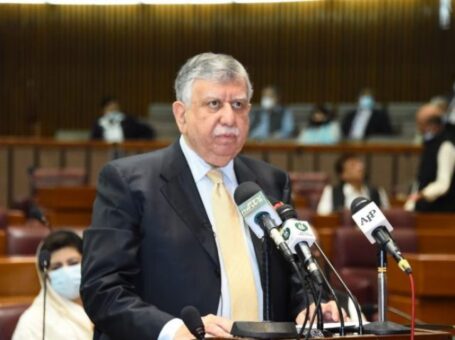ISLAMABAD: Finance Minister Shaukat Tarin on Wednesday chaired a meeting of the Monetary and Fiscal Policies Co-ordination Board.
Other members of the Board present in the meeting were the Adviser to the Prime Minister on Commerce & Investment, Deputy Chairman Planning Commission, Governor SBP, Dr. Asad Zaman and senior officials of the Finance Division.
Finance Minister briefed the Members of the Board on the current economic situation of the country and highlighted the major incentives given in the budget due to which business confidence is improving and economy is moving on strong economic recovery path.
It was also informed that all key economic indicators relating to real sector of the economy, fiscal sector, monetary and external sectors are going well and government is proactively executing all policy measures to achieve the major socio-economic targets of the current fiscal year.
He also highlighted the possible risks to the economic activities and strategy to counter these risks which were appreciated by the members of the Board.
Secretary Finance briefed the Members of the Board on budgetary allocations for various activities and informed about the ways and means to maintain the fiscal discipline.
He also shared the strategy to contain the non-development expenditure with the focus to optimally utilize resources of the country and improve the service delivery at large for the common man.
Governor SBP informed the Board about Monetary Policy stance. He shared the analysis of the SBP on policy rate, credit availability, exchange rate movement and inflationary situation.
He also explained that policy mix is supporting the growth momentum and highlighted the increase in commodities prices in the global market which have implications for higher import bill and inflation.
It was also informed that it is encouraging signs that exports are picking up along with increase in import of machineries which will enhance productive capacity of the economy and create exportable surplus.
He also explained the policy measures which SBP is executing to encourage business activities in various sectors of the economy and highlighted that there are ample opportunities for investors/exporters and youth of the country to take benefits from SBP’s schemes to extend or initiate their business.
Deputy Chairman Planning Commission apprised the meeting about the execution of development activities.
He also highlighted the possible options for resource mobilization and to utilize them effectively for development of potential sectors of the economy.
The Adviser to the PM on Commerce and Investment briefed about the structure of trade of the country along with major destinations.
He also presented the various measures which are under execution to enhance exports in potential areas. He also mentioned the various categories of imports which can be rationalized by focusing on their substitutes.
A comprehensive road map was also discussed to minimize trade deficit of the country. It was also highlighted that fiscal and monetary facilitation will continue for potential sectors of the economy.
Dr. Asad Zaman appreciated the major fiscal and monetary measures of the government which are supporting the business activities. He also highlighted the potential areas where Pakistan has comparative advantages in export market and also identified some low hanging fruits for import substitution.
He emphasized that the goal of well-coordinated Monetary and Fiscal Policies is to achieve full employment.
Minister for Finance & Revenue emphasized the importance of Monetary and Fiscal Policies Co-ordination Board for designing and executing policies to achieve economic targets and overcome the possible risks.
He advised to make this forum more effective for maintaining better coordination of policies to achieve the planned macroeconomic goals.
The chair urged that the Board should be more proactive in reviewing the impact of Fiscal and Monetary Policies on economic growth, employment and external sector of the economy, he concluded.
